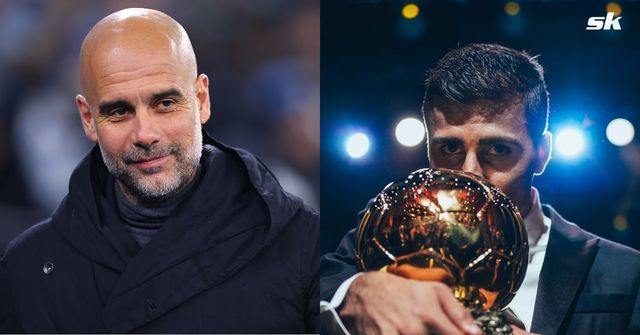Manchester City manager Pep Guardiola has suggested that Real Madrid’s Vinicius Junior may have been more deserving of the 2024 Ballon d’Or than his own player, Rodri Hernandez. The respected manager’s comments, made during a Tuesday interview, have reignited discussions about the award’s voting process and criteria.
Guardiola’s remarks are particularly noteworthy given that they favor a rival player over his own midfielder, Rodri, who claimed the prestigious award. The Spanish manager’s willingness to acknowledge Vinicius’s merit reflects his reputation for frank assessment of football talent, regardless of club affiliations.
In his characteristic thoughtful manner, Guardiola touched upon the nature of the Ballon d’Or voting system, noting that the decision-making process lies with journalists worldwide rather than what he termed “a group of elite people.” This observation seems to carry a subtle critique of the current voting mechanism, suggesting that perhaps those closest to the game might make different choices.
The manager’s comments also referenced last year’s controversy when Manchester City’s prolific striker Erling Haaland missed out on the award despite an exceptional season. Guardiola praised Haaland’s professional response to that decision, noting how the Norwegian striker gracefully congratulated Lionel Messi and maintained his focus on future improvement.
This latest intervention in the Ballon d’Or discourse comes at a time when the award’s voting criteria and process face increasing scrutiny from football professionals and fans alike. Guardiola’s suggestion that “if Vini would have won the Ballon d’Or, it would have been more than well deserved” adds significant weight to ongoing discussions about how football excellence should be measured and rewarded.
The timing of Guardiola’s comments is particularly interesting as they come during a period when Vinicius Junior has been receiving widespread acclaim for his performances with Real Madrid. The Brazilian winger’s combination of spectacular skill, decisive contributions, and growing leadership role has earned him recognition as one of football’s most exciting talents.
Guardiola’s perspective carries special significance given his status as one of football’s most successful and respected managers. His track record of developing world-class talent and winning major trophies lends considerable authority to his assessment of player performance and achievement.
The manager’s willingness to suggest that a rival player might have been more deserving than his own demonstrates the kind of objectivity and fair-mindedness that has characterized his approach to football throughout his career. It also highlights the complex relationship between individual awards and team success in modern football.
The reference to Haaland’s previous experience with the Ballon d’Or adds another layer to Guardiola’s commentary. By drawing this parallel, he seems to be highlighting a pattern where exceptional performances might not always receive the recognition they deserve through the current voting system.
Looking beyond the immediate controversy, Guardiola’s comments raise important questions about how football excellence is evaluated and rewarded. The suggestion that the current voting system might not always reflect the views of those most deeply involved in the sport could prompt valuable discussions about potential reforms to the award process.
As the football world digests these remarks, they are likely to fuel ongoing debates about the Ballon d’Or’s significance and whether its current format truly captures the essence of football excellence. Guardiola’s intervention, coming from someone at the very pinnacle of the sport, adds a valuable perspective to these discussions.
The implications of these comments extend beyond the immediate question of who should have won this year’s award. They touch upon broader issues about how football achievement is measured, recognized, and celebrated in the modern game. As the sport continues to evolve, such discussions become increasingly relevant to its future development.
For now, Guardiola’s candid assessment stands as a reminder that even in the competitive world of top-flight football, there is room for objective recognition of excellence, regardless of club allegiances or personal connections. His words might well influence future discussions about how football’s highest individual honors are awarded.




